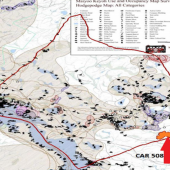Abstract: This literature review delves into the intricate relationship between community gardens and the enduring legacy of colonialism. While community gardens offer numerous benefits, such as increased food security and building community connections, there is a gap in inquiry around their historical and cultural context, especially relating to colonial legacies. This review explores postcolonial theory and decolonization frameworks through key contributors such as Edward Said, Gayatri Spivak, and Frantz Fanon, to understand the power dynamics of land access, knowledge systems, and cultural representation within community gardens. It examines the potential of community gardens to spur cultural revitalization, ecological sustainability, and decolonization while considering and discussing the challenges and necessary considerations for achieving these goals. This inquiry is timely, along with other broader decolonization movements, and it discusses the importance of centering Indigenous Traditional Ecological Knowledge (ITEK). After reviewing the existing literature, gaps were identified for further inquiry to be proposed. That contributes to the ongoing conversation of decolonization as a method to address social change and environmental concerns within community gardens.
Continue ReadingThe White Kid at the Native American Camp
Continue Reading
Effective bases of environmental decision-making build upon multiple and divergent understandings of landscapes and landscape connection. This paper develops ‘ethnogeomorphology’ as a tool for developing a shared (if contested) landscape platform for sharing worldviews and perspectives. Interfaces of intercultural communication, particularly with many Indigenous knowledges, are spaces of crucial juncture in understanding challenges of environmental and social sustainability and their relevance extends far beyond only ‘Indigenous studies’. Methodologies that aim to empower many Indigenous communities in documenting their knowledges can fail when attempting to communicate them in terms of conventional cause-and-effect science based on assumptions of linear and static spatial perspectives. This paper documents one such failure in practice with the Maiyoo Keyoh in Canada, and draws upon research conducted with the Yorta Yorta Nation (south-eastern Australia), the Stò:lō Nation (British Columbia, Canada), the Maiyoo Keyoh (northern British Columbia) and the Tia Kina Te Taiao (in New Zealand), from 2007-2011. Emerging insights in geography offer critical insight in addressing some of these challenges in practical ways, as increasing unrest in ‘physical’ disciplines (such as geomorphology), contest traditional binaries between ‘physical’ and ‘human’. This paper argues that geomorphic landscapes themselves are good learning tools that illustrate dynamic time-spaces. Recent developments around concepts of emergence, contingency and complexity, addressed through system-specific applications, point to reengagement with ‘place’. Similarly, conceptual developments in human geography see concepts of “scale as relation” rather than ‘scale as level’, also offers synergistic perspectives with physical geography founded on seeing multiple scales simultaneously. This solid grounding of coherence in geography could contribute to a practical and grounded basis of sustainability. Rather than being limited to theoretical debates, this paper illustrates the potential of a hybrid geography in practice. This convergence/hybridity in perspectives is not a conflation of knowledges, but an opportunity for situating worldviews in dialogue, assisting efforts to decolonize intercultural communication and promote ethical engagement in practice. This ‘ethnogeomorphic’ perspective offers a reconsideration of the term ‘adaptive’ in ‘adaptive management’, framed around multiple connections to landscapes, rather than as a tool restricted to Western science.
Continue Reading